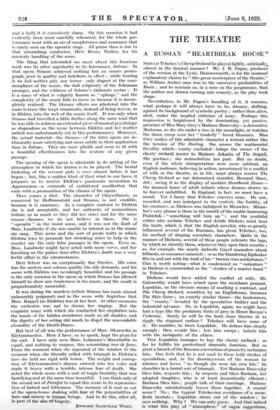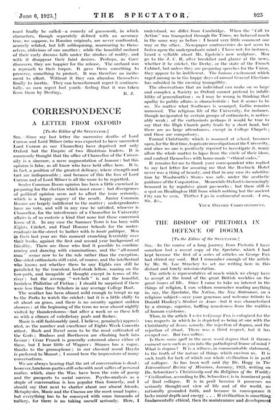THE THEATRE
A RUSSIAN "HEARTBREAK HOUSE"
SnouLD Tchehov's Cherry Orchard be played lightly, satirically, almost in the farcical manner ? Mr. J. B. Fagan, producer of the version at the Lyric, Hammersmith, is for the moment explanatory chorus to " this great masterpiece of the theatre," as William Archer once was to the successive profundities of Ibsen ; and he reminds us, in a note on the programme, that the author saw drama turning into comedy, as the play took shape.
Nevertheless, in Mr. Fagan's handling of it, it remains, what perhaps it will always have to be, dreamy, drifting, against its background of symbolic poetry ; rather than alive, alert, under the implied criticism of irony. Perhaps this impression is heightened by the dominating, yet passive, presence of Miss Mary Grey's Madame Ranevsky—a decorative Madonna, as she sits under a tree in the moonlight, or watches the dawn creep over her " tenderly " loved blossoms. Miss Grey makes of this admirable character a woman rather like the heroine of The Darling. She misses the sentimental frivolity which—vanity excluded—brings the owner cf the cherry orchard nearer to Madame Arkadin of The Seagull. She poetizes ; she melancholizes her part. But no doubt, even if the whole interpretation were more satirical, an English audience, believing in action, accustomed to a conflict of wills in the theatre, as in life, must always receive The Cherry Orchard as our determined moralist, Bernard Shaw, did ; seeing it as the display of another Heartbreak House— the doomed home of adult infants whose dreams deserve to be forever unfulfilled. In England, in fact, we must have a moral. Yet I fancy that Tchehov conveys none. He saw, recorded, and was indulgent to the veulerie, the futility, of his creatures, as Dickens was indulgent to Micawber. Micaw- ber's very phrase is there in the mouth of the rouble-borrowing Pishtchik—" something will turn up " ; and the youthful critics who acclaim Tchehov and deride Dickens must hear the truth, which is that the English novelist, who so greatly influenced several of the Russians, has given Tchehov, too, his method of shaping secondary characters. Quite in the manner of Dickens, several of these people reiterate the tags, by which we identify them, whenever they open their mouths ; as, for example, the nearly imbecile Gayef maunders about billiards, or consumes caramels ; or as the blundering Epihodov flits in and out with the trail of his " twenty-two misfortunes." This is worth noting—what is condemned as " caricature " in Dickens is commended as the " strokes of a master hand " in Tchehov.
Dickens would have added the conflict of wills. Mr. Galsworthy would have seized upon the merchant peasant, Lopakhin, as the obvious means of marking a contrast, and The Cherry Orchard, rewritten by an Englishman, becomes The Skin Game ; an exactly similar theme—the landowners, the " county," invaded by the speculative builder and the industrial advance. Or, in Lopakhin, again, we might have had a type like the predatory birds of prey in Henri Becque's Corbeaux. Surely he will be the hard stone thrown in to ripple the stagnant surface ? Tehehov will have none of it. He muddles, he blurs Lopakhin. He defines him clearly enough ; then avoids him ; lets him escape ; infects him with the ambiguity of the others.
True Lopakhin manages to buy the cherry orchard : so far 'he fulfills his predestined dramatic function. But so great a breach of the Russian convention of passivity inebriates him. One feels that he is not used to these bold strokes of speculation, and, in the drawing-room of the woman he admires and loves, " as though she were his own kin," he stumbles-in a brutal sort of triumph. Yet Madame Ranevsky likes him, respects him ; he respects and likes Barbara, her adopted - daughter, who is at least domestically efficient ; Barbara likes him ; people talk of their marriage. Madame Ranevsky ostentatiously leaves them together. A crucial scene ? No ; the typical Tchehovian avoidance of a scene. Both hesitate ; Lopakhin stares out of the window ; he says nothing. Why ? We can only guess. And that indeed is what this play of " atmosphere," of vague suggestions, must finally be called—a comedy of guesswork, in which characters, though separately defined with an accuracy true, we suppose, to Russian originals, are never confronted, scarcely related, but left soliloquising, murmuring to them- selves, oblivious of one another ; while the beautiful orchard of their early dreams falls under the strokes of reality, and with it disappear their faint desires. Perhaps, as Gaev 'discovers, they are happier for the release. The orchard was a reproach to their torpor. It gave them something to preserve, something to protect. It was therefore an incite- ment to effort. Without it they can abandon themselves finally to inertia. They can henceforward regret it sentimen- tally, as men regret lost youth—feeling that it was taken















































 Previous page
Previous page